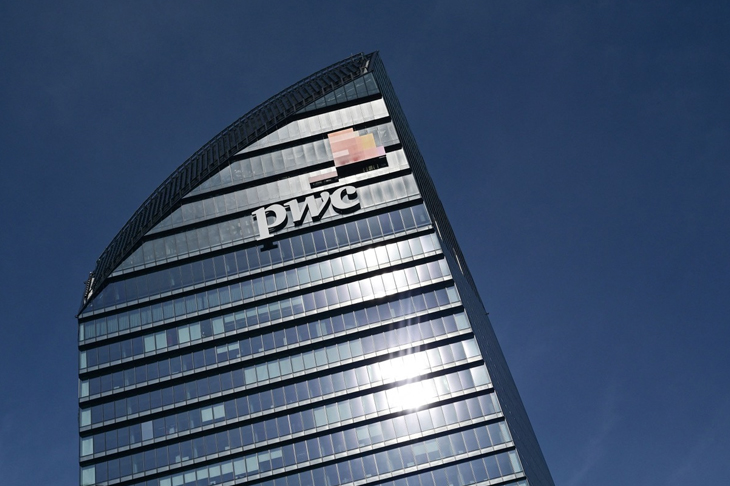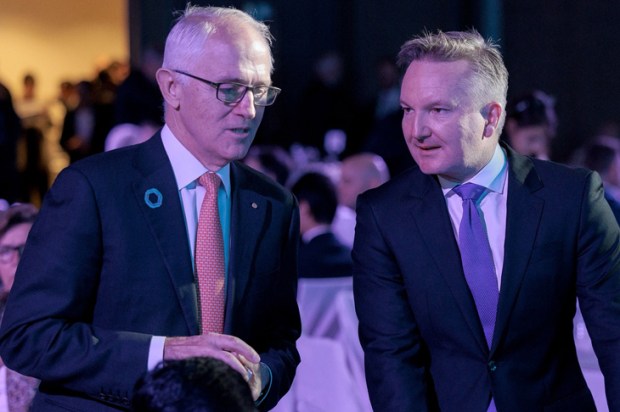My guess is that many Speccie readers have been quietly enjoying the ongoing imbroglio enveloping PwC. Using confidential material obtained from the government to benefit clients is one thing, but to simultaneously claim to be some sort of poster child for every woke cause known to personkind (good one, Judith) is another thing altogether.
You know the sort of rubbish: it’s not about profit, it’s about making a difference. According to the PwC website, its role is ‘to build trust in society and solve important problems’. How a large accounting/consulting firm with extremely well-paid partners could be expected ‘to build trust in society’ is anyone’s guess.
But it gets worse: ‘our high standards of ethical behaviour are fundamental to everything we do. Our values define who we are, what we stand for, and how we behave.’ Oh, please! I wonder how much PwC paid to some dodgy corporate communications company for those guffy sentences.
If we were naively to assume that PwC problems were confined to a handful of covetous, cunning partners seeing a chance to making a killing, it would be one thing. But the reality is that the entire consulting industrial complex, including the other big three – Deloitte, KPMG and EY – face the same potential conflicts. By expanding from boring audit firms with the provision of a bit of (expensive) tax advice on the side, these firms have become brutal behemoths seeking profitable work anywhere they can, particularly from governments.
To demonstrate the similarity of the vomit-inducing websites of the big four (and to demonstrate that I’m not just picking on PwC) let me give you some examples:
– At Deloitte, our purpose is to make an impact that matters. To set high standards of excellence and achieve them. We believe in authenticity. When we bring our true selves to every aspect of our lives, we invite others to do the same, creating a butterfly effect of powerful and vibrant change. Our partnership with WorldPride and Mardi Gras gives us the opportunity to be part of the broader discussions about diversity and inclusion.
– In 2017, KPMG Australia set out its inaugural Climate Action Plan 2018-2022, outlining our commitments to climate action and our roadmap to achieving net zero emissions by 2030, in line with KPMG International’s science-based target.
– At EY, our purpose is Building a Better Working World. The insights and quality we provide help build trust and confidence in the capital markets and in economies the world over. We develop outstanding leaders who team to deliver on our promises to all our stakeholders. In so doing, we play a critical role in building a better working world.
Now you might think that I’m making all this up. But, sadly, the woke virus has spread and all the big four are just carbon-copies (gettit?) of each other. What ever happened to simply providing valuable services to clients at competitive prices and making a profit? Do these sycophantic communications advisers really think this sort of oily nonsense would encourage new clients to consider using the services of the firm?
While it might be good sport to see the unravelling of PwC in Australia – along with the federal government and its agencies, state governments are also abandoning the firm – the broader reality is that the brand names of all the big four are being trashed by current developments. The unquestioning trust that far too many politicians and public servants placed in these firms is being shaken. That’s a good thing.
Their global annual turnovers resemble the GDP of a number of African countries combined. Their consulting income very often exceeds their audit income. From defence matters to IT, from human services to climate matters – there is not a topic on which they would refuse to consult, given the right price. Governments have become their principal clients, outside audit.
(Recently, EY attempted to demerge its operations by splitting the audit side from the consulting side. The complexity in achieving this outcome was vast: EY, like the other three, are federated partnerships, not listed companies, and have convoluted governance arrangements. In the end, the demerger failed. EY will continue to look like its audit/consulting cousins.)
There are two obvious questions. Why has government demand for the consulting services of the big four exploded over the past decade or so? Should not the projects that ministers and bureaucrats regard as so important be undertaken by public servants themselves rather than highly paid consultants?
There are several ways of answering these questions, although the information that governments provide on the use of consultants and the dollar figures attached is fairly slight. Government departments are required to list the consultants used, the name of the project and the dollar values as part of their Annual Reports.
It has been estimated that in 2020 to 2021, the federal government spent nearly $21 billion on outside consultants, which included the big four. (This figure was inflated because of Covid, it has to be admitted.)
There is clearly a degree of ‘arse-covering’ – to use a technical term – by public servants when consultants are used rather than the work being done in-house. When things turn pear-shaped, the blame can be placed on the firm rather than the public servants being held directly accountable.
Having said this, most public servants have no contracting skills and consulting firms regularly take their government clients to the cleaners. In the meantime, the quality of public servants, more generally, takes a dive.
There is a widely accepted view that the federal government is no good at providing services and so consultants are needed to map out the required steps and the means of implementation. Whether the consultants are really any better at this task is extremely unclear. (The most appropriate advice would be ‘don’t do it’ or hand it over to state governments which are better equipped at service provision.)
But the consultants are very clever at offering up staged assistance, with one project needing a follow-up one to make any sense (which includes remedying the mistakes made initially). It’s a great business model, with projects involving many millions of dollars of guaranteed cash flow.
According to Finance Minister, Katy Gallagher, ‘the Albanese government acknowledges that there is a role for external labour but, where it is used, it should provide a clear value-add and not simply plug holes created by an ideological obsession to gut the Australian Public Service.’
The real danger now is that the consulting firms will continue to be used big-time, save for a time on the bench for PwC, and the APS will also expand. That’s what you call a lose-lose situation – to use consultant-speak.
Got something to add? Join the discussion and comment below.
Get 10 issues for just $10
Subscribe to The Spectator Australia today for the next 10 magazine issues, plus full online access, for just $10.
You might disagree with half of it, but you’ll enjoy reading all of it. Try your first month for free, then just $2 a week for the remainder of your first year.













Comments
Don't miss out
Join the conversation with other Spectator Australia readers. Subscribe to leave a comment.
SUBSCRIBEAlready a subscriber? Log in